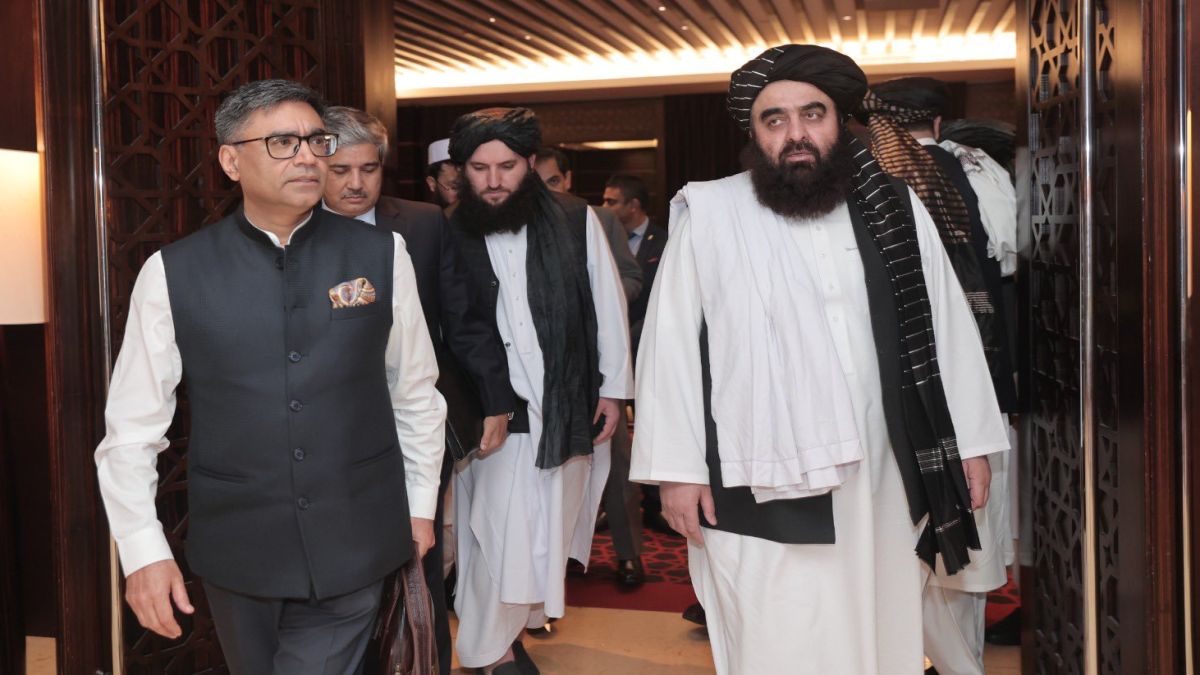On Wednesday (January 8), India’s Foreign Secretary Vikram Misri held talks with Afghanistan’s acting Foreign Minister Mawlawi Amir Khan Muttaqi in Dubai. These discussions are the first open talks that the two sides have held since the Taliban returned to power in Kabul in 2021.
The talks are also part of India’s continuing engagement with Afghanistan in recent times. This is especially significant to note as New Delhi is yet to recognise the Taliban regime in the country.
What was discussed in the meeting? Why do these talks matter to New Delhi? We unpack all this and more in our explainer.
Where and who attended the meet?
On Wednesday (January 7), India’s Ministry of External Affairs (MEA) announced that Foreign Secretary Vikram Misri held talks with Acting Foreign Minister of Afghanistan, Mawlawi Amir Khan Muttaqi, in Dubai.
Until now, an official from New Delhi at the Joint Secretary level has been meeting with Taliban ministers but Misri’s meeting is an upgrade, signalling better engagement from New Delhi’s side.
What did the two sides discuss in the meet?
The meeting between Misri and Muttaqi wasn’t just a meet-and-greet. The two held talks on various issues — ranging from humanitarian assistance programmes to cricket.
According to the MEA statement following the talks, New Delhi has agreed to provide material support to the health sector and for the rehabilitation of refugees. “In response to the request from the Afghan side, India will provide further material support in the first instance to the health sector and for the rehabilitation of refugees,” the MEA said.
This is in continuance to India’s stance so far; New Delhi has already shipped 50,000 metric tonnes of wheat, 300 tonnes of medicines, 27 tonnes of earthquake relief aid, 40,000 litres of pesticides, 100 million polio doses, 1.5 million doses of COVID Vaccine, 11,000 units of hygiene kits for the drug de-addiction programme, 500 units of winter clothing and 1.2 tonnes of stationery kits to Kabul.
Moreover, Misri, as per the MEA statement, also told the Afghan minister that New Delhi would consider engaging in development projects in the near future. This is of particular importance as India, which had a number of active development projects in the country, had stopped after the Taliban took over the Central Asian country.
During Misri’s talks with the Taliban minister, it was also agreed upon that trade and commerce would be promoted, including through the Chabahar Port. “It was also agreed to promote the use of Chabahar port for supporting trade and commercial activities, including for the purpose of humanitarian assistance for Afghanistan,” MEA said.
“The two sides also discussed strengthening sports (cricket) cooperation, which is highly valued by the young generation of Afghanistan,” said the MEA in a statement.
The Taliban in a post-meeting statement also added that the two sides reviewed the security situation in the region. The Taliban stated that Muttaqi assured the Indian delegation that his government is pursuing a “balanced and economy-oriented foreign policy.” He expressed his desire for political and economic relations with India, recognising its significance as a prominent economic country in the region. “Our foreign minister assured the Indian side that there is no danger to anyone from Afghanistan and expressed hope for strengthening diplomatic relations and creating facilities related to visas for businessmen, patients, and students,” said the Taliban statement.
The Taliban also added that India had acknowledged its role in the fight against drugs and corruption in the country.
It’s important to note that there was no mention of the issue of women’s rights in the MEA or Taliban statement. Since their return to power, the Taliban has slowly but surely chipped away at women’s rights in Afghanistan, making them almost invisible in the country.
Why is India now engaging with the Taliban?
Since the Taliban resumed control of Afghanistan after ousting the Ashraf Ghani government, it has been seeking engagement with New Delhi. While India, initially, didn’t engage with them, in the recent past it has edged closer. Recently, New Delhi reopened its diplomatic mission in Kabul, manned by lower-level diplomats.
The overtures began in 2022 when J P Singh, Joint Secretary (Pakistan, Afghanistan and Iran) in the Ministry of External Affairs, met key Taliban leaders. Since then, Singh and other officials have had at least four meetings, before the Foreign Secretary’s meeting was arranged in Dubai.
But why is New Delhi engaging with the Taliban despite not recognising them officially? One of the main reasons is Pakistan.
India’s engagement with Afghanistan comes at a time when the Taliban’s ties with Pakistan are strained . Kabul’s ties with Islamabad have lately been strained over allegations that the Taliban harbour and support fugitive terrorists linked to the outlawed Tehrik-i-Taliban Pakistan, or TTP , in carrying out “terrorist” attacks against Pakistani civilians and security forces.
Last month, the Pakistani military allegedly carried out airstrikes against suspected TTP hideouts in an Afghan border province, drawing strong condemnation from the Taliban. Kabul claimed the bombardment took the lives of nearly 50 “refugees” from Pakistan. Noticeably, India condemned the strikes, saying it was Islamabad’s “old practice” to blame its neighbours for its internal failure.
There’s also the China factor. India is aware that Beijing is cosying up to the Taliban and that could endanger New Delhi’s position in the Central Asian region. Since their coming to power, Beijing has been courting the Taliban with an eye on Afghanistan’s resources.
With inputs from agencies


)

)
)
)
)
)
)
)
)



